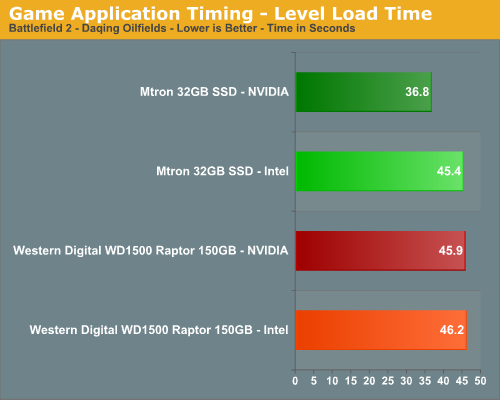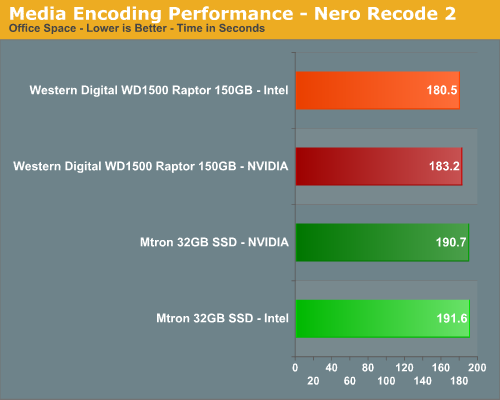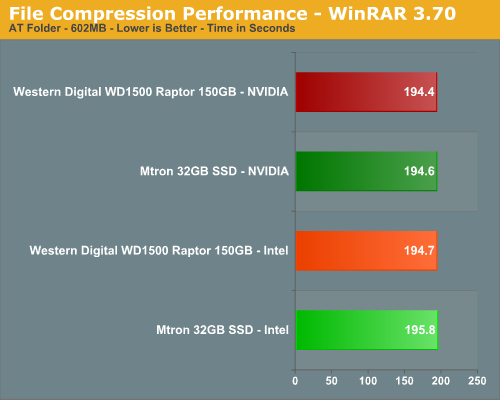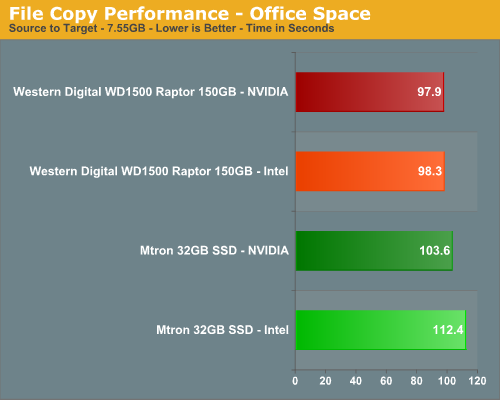MTRON SSD 32GB: Wile E. Coyote or Road Runner?
by Gary Key on August 15, 2007 3:00 AM EST- Posted in
- Storage
Actual Application Performance
Our application benchmarks are designed to show application performance results with times being reported in seconds, with lower scores being better. While these tests will show differences between the drives it is important to understand we are no longer measuring the synthetic performance of the hard drive but how well our test platforms perform with each individual drive. The performance of a drive is an integral part of the computer platform but other factors such as memory, CPU, core logic, and even driver choice can play a major role in determining how well the drive performs in any given task.
Game Level Load
This test centers on the actual loading of a playable level within our game selection. It is obvious based on the drive's specifications that this drive could be used in a gaming system, though its capacity severely limits the amount of newer multi-Gigabyte titles you can load on it. We have found in gaming that the burst/sustained read speed and access time of a drive is very important. Considering SSDs excel in low access (latency) times we thought it would be interesting to see how well this drive performs in one of our more demanding game tests. The Battlefield 2 test measures the time it takes to load the Daqing Oilfields level. Our application timer begins when the start single player icon is initiated and ends when the join game icon is visible.

This is one of the more demanding game level load times we test currently and the MTRON drive scores first, although the margin is minimal with the Intel chipset. Our NVIDIA based board loads this particular level 8.6 seconds faster than the Intel board, resulting in a 20% improvement over the Raptor. After several hours of game play we could definitely tell a difference between the two drives in this test. The MTRON SSD product always seems to load the levels in a smoother manner than our Raptor although it is difficult to determine any actual speed differences except when first starting the game. The lack of hard drive noise is a welcome relief when playing games with the MTRON drive.
Nero Recode
Our encoding test is quite easy - we take our original Office Space DVD and use AnyDVD Ripper to copy the full DVD to the hard drive without compression, thus providing an almost exact duplicate of the DVD. We then fire up Nero Recode 2, select our Office Space copy on the hard drive, and perform a shrink operation to allow the entire movie along with extras to fit on a single 4.5GB DVD disc. We leave all options on their defaults except we turn off the advanced analysis option. The scores reported include the full encoding process and are represented in seconds, with lower numbers indicating better performance.

This test is primarily dependent on CPU performance but the write performance of a drive can make small but measurable differences in completion times. As in our PCMark05 tests, the write performance of the MTRON drive does not match that of our Raptor and the resulting performance is about 6% slower than the Raptor. We typically find in this particular test that the CPU throughput of the Intel chipsets is a little better than the NVIDIA chipsets and our Raptor results bear this out. However, due to the better write speed performance of the NVIDIA chipset with the MTRON drive, we see it scoring ahead of the Intel solution even with the CPU throughput disadvantage.
WinRAR 3.70
Our WinRAR test measures the time it takes to compress our test folder that contains 444 files, 10 folders, and 602MB of data. While the benchmark is CPU intensive for the compression tests it still requires a fast storage system to keep pace with the CPU. A drive that offers excellent write performance can make a slight difference in this benchmark.

This test relies on the CPU and also the burst rates of the storage system. Even handicapped with a 36% lower burst speed and 6% lower write speeds, the MTRON drive is basically even with the Raptor. The difference between the NVIDIA and Intel chipsets with the MTRON drive is only 1% in this test. In other words, WinRAR file compression - even with a fast CPU - is so limited by CPU and memory performance that hard drive speed rarely comes into play.
File Copy Performance
Our file copy test measures the time it takes to transfer our test folder that contains 29 files, 1 folder, and has 7.55GB of data from our source drive to the target test drive. This benchmark is disk write intensive and requires a fast storage system.

We finish our application tests with a benchmark that favors the Raptor drive because it represents a pure write scenario. As in PCMark05 where the largest differences in scores were generated with the write tests, we see the SSD product being up to 13% slower. However, that margin is only 6% when comparing the results with the NVIDIA chipsets as the MTRON drive is almost 8% slower on the Intel chipset.
Our application benchmarks are designed to show application performance results with times being reported in seconds, with lower scores being better. While these tests will show differences between the drives it is important to understand we are no longer measuring the synthetic performance of the hard drive but how well our test platforms perform with each individual drive. The performance of a drive is an integral part of the computer platform but other factors such as memory, CPU, core logic, and even driver choice can play a major role in determining how well the drive performs in any given task.
Game Level Load
This test centers on the actual loading of a playable level within our game selection. It is obvious based on the drive's specifications that this drive could be used in a gaming system, though its capacity severely limits the amount of newer multi-Gigabyte titles you can load on it. We have found in gaming that the burst/sustained read speed and access time of a drive is very important. Considering SSDs excel in low access (latency) times we thought it would be interesting to see how well this drive performs in one of our more demanding game tests. The Battlefield 2 test measures the time it takes to load the Daqing Oilfields level. Our application timer begins when the start single player icon is initiated and ends when the join game icon is visible.

This is one of the more demanding game level load times we test currently and the MTRON drive scores first, although the margin is minimal with the Intel chipset. Our NVIDIA based board loads this particular level 8.6 seconds faster than the Intel board, resulting in a 20% improvement over the Raptor. After several hours of game play we could definitely tell a difference between the two drives in this test. The MTRON SSD product always seems to load the levels in a smoother manner than our Raptor although it is difficult to determine any actual speed differences except when first starting the game. The lack of hard drive noise is a welcome relief when playing games with the MTRON drive.
Nero Recode
Our encoding test is quite easy - we take our original Office Space DVD and use AnyDVD Ripper to copy the full DVD to the hard drive without compression, thus providing an almost exact duplicate of the DVD. We then fire up Nero Recode 2, select our Office Space copy on the hard drive, and perform a shrink operation to allow the entire movie along with extras to fit on a single 4.5GB DVD disc. We leave all options on their defaults except we turn off the advanced analysis option. The scores reported include the full encoding process and are represented in seconds, with lower numbers indicating better performance.

This test is primarily dependent on CPU performance but the write performance of a drive can make small but measurable differences in completion times. As in our PCMark05 tests, the write performance of the MTRON drive does not match that of our Raptor and the resulting performance is about 6% slower than the Raptor. We typically find in this particular test that the CPU throughput of the Intel chipsets is a little better than the NVIDIA chipsets and our Raptor results bear this out. However, due to the better write speed performance of the NVIDIA chipset with the MTRON drive, we see it scoring ahead of the Intel solution even with the CPU throughput disadvantage.
WinRAR 3.70
Our WinRAR test measures the time it takes to compress our test folder that contains 444 files, 10 folders, and 602MB of data. While the benchmark is CPU intensive for the compression tests it still requires a fast storage system to keep pace with the CPU. A drive that offers excellent write performance can make a slight difference in this benchmark.

This test relies on the CPU and also the burst rates of the storage system. Even handicapped with a 36% lower burst speed and 6% lower write speeds, the MTRON drive is basically even with the Raptor. The difference between the NVIDIA and Intel chipsets with the MTRON drive is only 1% in this test. In other words, WinRAR file compression - even with a fast CPU - is so limited by CPU and memory performance that hard drive speed rarely comes into play.
File Copy Performance
Our file copy test measures the time it takes to transfer our test folder that contains 29 files, 1 folder, and has 7.55GB of data from our source drive to the target test drive. This benchmark is disk write intensive and requires a fast storage system.

We finish our application tests with a benchmark that favors the Raptor drive because it represents a pure write scenario. As in PCMark05 where the largest differences in scores were generated with the write tests, we see the SSD product being up to 13% slower. However, that margin is only 6% when comparing the results with the NVIDIA chipsets as the MTRON drive is almost 8% slower on the Intel chipset.










37 Comments
View All Comments
mostlyprudent - Wednesday, August 15, 2007 - link
I hope Gary's 3 year prediction is as wrong as AT's (and just about everyone else's) prediction about DDR3 speeds and latencies! I am quite impressed by what has happened in SSD technology over the last year or so.AnnihilatorX - Wednesday, August 15, 2007 - link
Well I do rip loseless audio from CDs. On some types of music I can hear differences betwween mp3 and ape32GB is just enough for a Windows installation plus few applications
It's best to store multimedia files to a HDD
yyrkoon - Thursday, August 16, 2007 - link
80MB/s sustained is more than enough for video editing, and I am not sure you guys understand this or not, but until now, this is the first test I have personally seen that the SSD comes this close to overall standard HDD in performance. The Raptor may peak higher, but if I am reading these benchmarks correctly, this drive is FAST. Take the sub milisecond access times, and you have something worth talking about.As for Windows boot times, I think if you compared this even to a Raptor, you would notice a diference in bootup times. Windows may not need much more than ~12MB/s transfers, but the very low access times will show a noticable difference. Maybe only a second or two, but in Windows boot times, this is outstanding given the current performance of all current HDDs.
Uh, WinXP only needs ~1.5GB-4GB for a base install, this gives plenty of room for other applications. I do not know how other people install their OSes, but this is perfect for me, since I keep all my data(important or not) on a different drive from the OS anyhow. This SSD would probably serve great as a Photoshop scratch disk as well . . .
GlassHouse69 - Wednesday, August 15, 2007 - link
Windows itself doesnt need a fast drive. I load up windows 1x every 2-3 weeks. It is on 24/7. The swap file is affected, but with 2 gb of ram, dual core, xp pro, O&O defrag and no random crap programs loaded into memory unnecessarily, I never see my hd tic when I am using windows.Now, network transfers it can show, but that is for 1 hour here and there, maybe 3-4x a month. Really, what the fast hd is used for is encoding or decoding, compressing and uncompressing, and, most importantly, games. There you would never dream of using anything less than 100 gigs of space. So, this thing is completely useless. yay! I mean, unless you make a partition for your favorite games and another for some ripping usage, 32 gb is next to useless.
it is a great write up though. nicely done
AnnihilatorX - Friday, August 17, 2007 - link
Not entirely trueAlthough Windows at run-time does not need a fast drive,
Windows at boot-time and applications at load-time do improve a lot
Windows startup is 2x faster on SSD
That alone is the biggest selling point of SSD
Calin - Wednesday, August 15, 2007 - link
You might want to try a quick and dirty benchmark in Linux, maybe the situation is simply related to drivers. And maybe some quick and dirty benchmarks in XP versus Vista, just to see if the Intel chipset is slower in all configurationsEpyon - Wednesday, August 15, 2007 - link
Thanks for the review. Its great to have some concrete numbers to base opinions on SSDs.